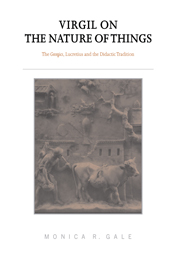Book contents
- Frontmatter
- Contents
- Preface
- List of abbreviations
- 1 Introduction: influence, allusion, intertextuality
- 2 Beginnings and endings
- 3 The gods, the farmer and the natural world
- 4 Virgil's metamorphoses: mythological allusions
- 5 Labor improbus
- 6 The wonders of the natural world
- 7 The cosmic battlefield: warfare and military imagery
- 8 Epilogue: the philosopher and the farmer
- Bibliography
- Index of passages cited
- General index
1 - Introduction: influence, allusion, intertextuality
Published online by Cambridge University Press: 15 October 2009
- Frontmatter
- Contents
- Preface
- List of abbreviations
- 1 Introduction: influence, allusion, intertextuality
- 2 Beginnings and endings
- 3 The gods, the farmer and the natural world
- 4 Virgil's metamorphoses: mythological allusions
- 5 Labor improbus
- 6 The wonders of the natural world
- 7 The cosmic battlefield: warfare and military imagery
- 8 Epilogue: the philosopher and the farmer
- Bibliography
- Index of passages cited
- General index
Summary
What kind of poem is Virgil's Georgics? This question has been answered – and indeed posed – in a surprising variety of ways by scholars and critics during the course of the twentieth century. Since the 1960s, debate has revolved particularly around the poet's political stance, and the related issue of the optimism or pessimism of his outlook. Should we see the Georgics as offering whole-hearted support to the nascent regime of Augustus, or is the poem in some way subtly subversive? How does the poet portray the relationship between the individual and society, or between human beings, the gods and the natural world? More recently, the focus of critical attention has begun to shift towards Virgil's relationship with the didactic tradition. In what sense can we regard the Georgics as an Ascraeum carmen (‘Hesiodic song’, 2.176)? Is Virgil's self-proclaimed affinity with Hesiod actually a red herring, which has diverted attention from closer parallels with the self-consciously learned and elegant verse handbooks of Aratus and Nicander, or with Lucretian philosophical didactic? Is the poem ‘really’ about agriculture? What, if anything, is the poet trying to teach? What is the relationship between the passages of agricultural instruction and the so-called digressions? What are we to make of Virgil's (apparently) cavalier attitude to technical accuracy in his agricultural subject-matter? Does the didactic praeceptor contradict himself, and if so, why?
Most of these controversial questions will be addressed in the course of this study; but my principal concern will be the relationship between the Georgics, Lucretius' De Rerum Natura, and the didactic tradition as a whole.
- Type
- Chapter
- Information
- Virgil on the Nature of ThingsThe Georgics, Lucretius and the Didactic Tradition, pp. 1 - 17Publisher: Cambridge University PressPrint publication year: 2000



